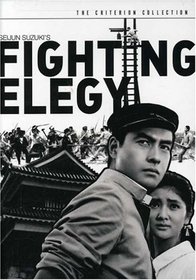| Actors: Hideki Takahashi, Yűsuke Kawazu, Junko Asano, Takeshi Kat˘, Isao Tamagawa Director: Seijun Suzuki Creators: Kenji Hagiwara, Masami Tanji, Kazu Otsuka, Kaneto Shind˘, Takashi Suzuki Genres: Action & Adventure, Indie & Art House, Classics, Comedy, Drama Sub-Genres: Action & Adventure, Indie & Art House, Classics, Comedy, Drama Studio: Criterion Format: DVD - Black and White,Color,Widescreen - Closed-captioned,Subtitled DVD Release Date: 01/11/2005 Release Year: 2005 Run Time: 1hr 26min Screens: Black and White,Color,Widescreen Number of Discs: 1 SwapaDVD Credits: 1 Total Copies: 0 Members Wishing: 4 Edition: Special Edition,Criterion Collection MPAA Rating: Unrated Languages: Japanese Subtitles: English |
Search - Fighting Elegy - Criterion Collection on DVD
  | Fighting Elegy - Criterion Collection Actors: Hideki Takahashi, Yűsuke Kawazu, Junko Asano, Takeshi Kat˘, Isao Tamagawa Director: Seijun Suzuki Genres: Action & Adventure, Indie & Art House, Classics, Comedy, Drama UR 2005 1hr 26min High schooler Nanbu Kiroku yearns for the prim, Catholic Michiko, but her only desire is to reform Kiroku's sinful tendencies. Hormones raging, Kiroku channels his unsatisfied lust into the only outlet available: savage cr... more » |
Larger Image |
Movie DetailsSimilar Movies
|
Movie Reviews"Boys be Ambitious!" Zack Davisson | Seattle, WA, USA | 06/05/2005 (5 out of 5 stars) "One of the classics themes of Japanese literature is the way of Koha, the "Hard School." A path of absolute masculinity, Koha requires absolute repression of sexual desires and avoidance of "weak" women, who are distractions from what make a man a man. Men are forged through intense, focused martial arts training and constant fighting to harden the warrior's soul. The way of Koha can be found is such seminal Japanese works as Mishima's "The Sailor Who Fell From Grace With the Sea." Seijun Suzuki thinks this is pretty funny. "Fighting Elegy" ("Kenka Erejii") is a sharp parody of Koha, taking a cynical look at the culture of boys in Japan, where the slogan "Boys be Ambitious!" can be heard shouted by mothers to their male children. All of the standards of a Koha flick are here; Kiroku Nanbu, the young upcoming tough with more spunk than ability. Turtle, an upper-student who becomes Kiroku's mentor in the ways of fighting. Michiko, a beautiful Catholic school girl who seeks to reveal Kiroku's soft side and lead him into love and marriage. Kiroku's inner battle between his lust for Michiko and his loyalty to Turtle is captured in the climatic line "I don't masturbate, I fight!" Under Suzuki's directorial hand, this mockery of Koha is both hilarious and insightful. The military culture of WW II is one of the legacies of Koha, and "Fighting Elegy" takes place in a Japan on the brink of the Martial Law of 1935. Suzuki takes the fangs out of this ultimately destructive philosophy. One of his two non-Yakuza films (the other being "Story of a Prostitute"), it is nice to see Suzuki tackle this politically-charged topic so capably. The Criterion Collection DVD for "Fighting Elegy" is fairly bare-bones, with no extra features other than two helpful essays, one on the film itself and one on Ikki Kita, founder of the militarization movement. Being a satire, it is impossible to truly appreciated "Fighting Elegy" without the necessary historical and political background that it dastardly mirrors and these essays go a long way towards filling in these missing pieces." White Hands Daitokuji31 | Black Glass | 08/26/2005 (4 out of 5 stars) "
Kiroku Nanbu seems to be a decent enough fellow. A Catholic, he attends church regularly with the family with whom he boards. He is respectful to his father, his elders, including older schoolmates, and adores Michiko a young girl who is the pinnacle of purity and innocence. However, Kiroku has another side as well. Beneath his kind ways, which are definitely genuine, lurks the heart and soul of a fighter. Constantly throughout the films eighty-six minutes Kiroku fights his way through upperclassmen and students at rival schools. Kiroku is the embodiment of "Koha" or the "hard school." Like Miyamoto Musashi, members of the hard school were supposed to hone their fighting skills to perfection and be the quintessence of masculinity, however, in order to reach this peak of manliness, the men were supposed to be indifferent to women. Yet, Kiroku cannot get the image of his beloved Michiko out of his head. Not wanting to sully the perfect image of Michiko that resides in his mind, Kiroku avoids taking "matters" into his own hands Therefore he gets into fights to use up his energy. However, Michiko also seems to like our young hero because of his manliness and desires to teach him such things as English and the piano. However, this of course causes Kiroku more anguish because he cannot get images such as Michiko's "white hands" out of his mind. Taking place in Okayama in the year 1935, Suzuki sets the film during Japan's expansionist period. The hard school image along with the power of the Japanese spirit was promulgated by the heads of the Imperial Japanese Army, and later Mishima Yukio, and this mentality led to the needless deaths of thousands of Japanese soldiers who charged into battles, in later years, with the superior forces of the Soviet Union. As he criticized the American occupation of Japan in Gate of Flesh, Suzuki in Fighting Elegy makes a farce out of the hard school. Fighting Elegy is an incredibly fun film by one of Japan's most individualistic directors. With its tongue-in-cheek look at Japan during the 1930s and, to a lesser extent, the Japanese military, Suzuki allows the audience to view young men so caught up in the ideals of manliness that they struggle to become full individuals. However, being that this is a Suzuki Seijun film, a director who states that there are no deeper meanings to his films than their entertainment value, my above statements might mean little more than ashes in water. Yet, it is definitely a fun ride! " |





